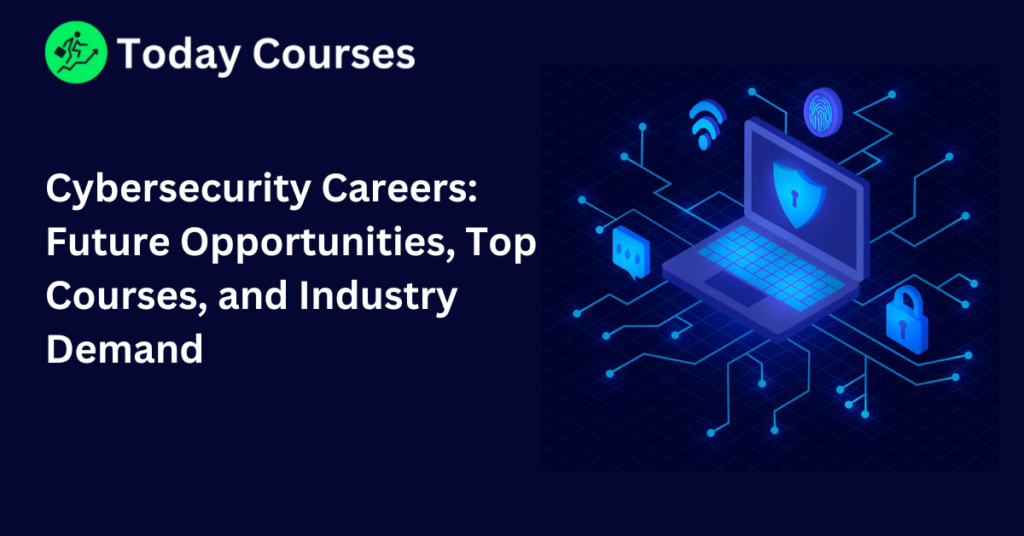Cybersecurity has become one of the most crucial aspects of modern technology, with the rise in cyber threats and data breaches making it a high-demand field across industries. As organizations continue to move their operations online, safeguarding data and systems from cyberattacks is more critical than ever. This has led to an increasing demand for professionals skilled in cybersecurity, making it one of the most promising career paths of the future.
The future of cybersecurity is bright, with the field expected to grow significantly in the coming years. According to recent reports, the global market is projected to reach over $500 billion by 2030. The rise of digital transformation, Internet of Things (IoT) devices, cloud computing, and the increasing sophistication of cyberattacks are all key drivers for this growth. Key trends shaping the future of cybersecurity include:
- Artificial Intelligence (AI) and Machine Learning (ML) in Cyber Defense: AI and ML will play a crucial role in predicting and mitigating threats in real-time.
- Cloud Security: As more businesses migrate to cloud services, securing cloud infrastructures will be critical.
- Zero Trust Architecture: This approach, which requires verification for anyone accessing resources, will become standard for network security.
- Quantum Computing Risks: Quantum computing could pose significant challenges for encryption standards, making cryptographic security even more important.
Where to learn Cybersecurity
There are numerous platforms offering cybersecurity courses that range from foundational knowledge to advanced, specialized certifications. Here are some of the best places to learn cybersecurity:
- Certified Information Systems Security Professional (CISSP) – This is one of the most well-recognized certifications in cybersecurity. It’s ideal for professionals with experience who want to validate their expertise.
- CompTIA Security+ – A good starting point for beginners, this course covers fundamental concepts of network security, threat management, and vulnerability mitigation.
- Certified Ethical Hacker (CEH) – Offered by EC-Council, this course teaches penetration testing and helps professionals understand the mindset of hackers.
- Coursera and edX – Offer cybersecurity courses in collaboration with top universities like Stanford, MIT, and Harvard.
- SANS Institute – Known for its hands-on, technical training programs in cybersecurity, SANS offers a range of certifications including GIAC.
Career Opportunities in Cybersecurity
Cyber Security offers a wide array of career paths, each with its own set of responsibilities and expertise. Here are some of the top career roles:
- Cybersecurity Analyst: Responsible for monitoring security incidents and responding to threats, a cybersecurity analyst is a front-line defender of an organization’s data.
- Penetration Tester (Ethical Hacker): Penetration testers simulate attacks to find vulnerabilities in systems before actual hackers do.
- Security Architect: This role involves designing and implementing security systems to protect an organization’s data and IT infrastructure.
- Incident Responder: These professionals respond to cyberattacks, investigate breaches, and implement measures to prevent future incidents.
- Chief Information Security Officer (CISO): A senior executive who oversees the entire security strategy of an organization, ensuring that its digital assets are protected.
Roles and Responsibilities of a Cloud Security Engineer
Cloud security engineers are becoming increasingly important as organizations shift their operations to cloud-based platforms like AWS, Azure, and Google Cloud. The primary responsibilities of a cloud security engineer include:
- Cloud Infrastructure Security: Implementing and managing security protocols to protect cloud infrastructure.
- Data Protection: Ensuring that sensitive data stored on the cloud is encrypted and accessible only to authorized users.
- Threat Detection and Response: Continuously monitoring cloud environments for potential threats and vulnerabilities and taking appropriate action to mitigate them.
- Compliance: Ensuring that cloud deployments comply with industry-specific regulations and standards, such as GDPR, HIPAA, and PCI-DSS.
- Automation: Using automation tools to streamline security processes like patching, backup, and disaster recovery.
Demand for Cybersecurity in Various Industries
- Finance: Banks and financial institutions handle vast amounts of sensitive data, making them prime targets for cybercriminals. Protecting customer information and financial transactions is crucial.
- Healthcare: With the rise of telemedicine and digital health records, securing patient data has become a priority in the healthcare industry.
- Retail: E-commerce and retail businesses handle large volumes of customer data, including payment information, which needs to be secured against breaches.
- Government: Government agencies manage critical national infrastructure and sensitive citizen data, necessitating stringent cybersecurity measures.
- Telecommunications: With the advent of 5G and IoT, telecommunications companies face new cybersecurity challenges, increasing the need for skilled professionals.
How to Apply for Cybersecurity Jobs After Completing the Course
Once you’ve completed your cybersecurity course and obtained relevant certifications, there are several ways to approach the job market:
- Build a Strong Resume and Portfolio: Highlight your certifications, practical projects, and hands-on experience. Employers look for individuals who have worked with real-world security systems.
- Leverage Job Portals: Platforms like LinkedIn, Indeed, and Glassdoor are great places to find cybersecurity job openings. Keep your profile updated with your skills and certifications.
- Attend Networking Events and Conferences: Cybersecurity conferences such as Black Hat and DEF CON are great for networking and finding job opportunities.
- Internships and Apprenticeships: If you’re new to cybersecurity, starting with an internship can give you hands-on experience and open doors to full-time positions.
- Target Industries with High Demand: Finance, healthcare, and government sectors often have the highest demand for cybersecurity professionals, so focusing on these industries may help you secure a job faster.





